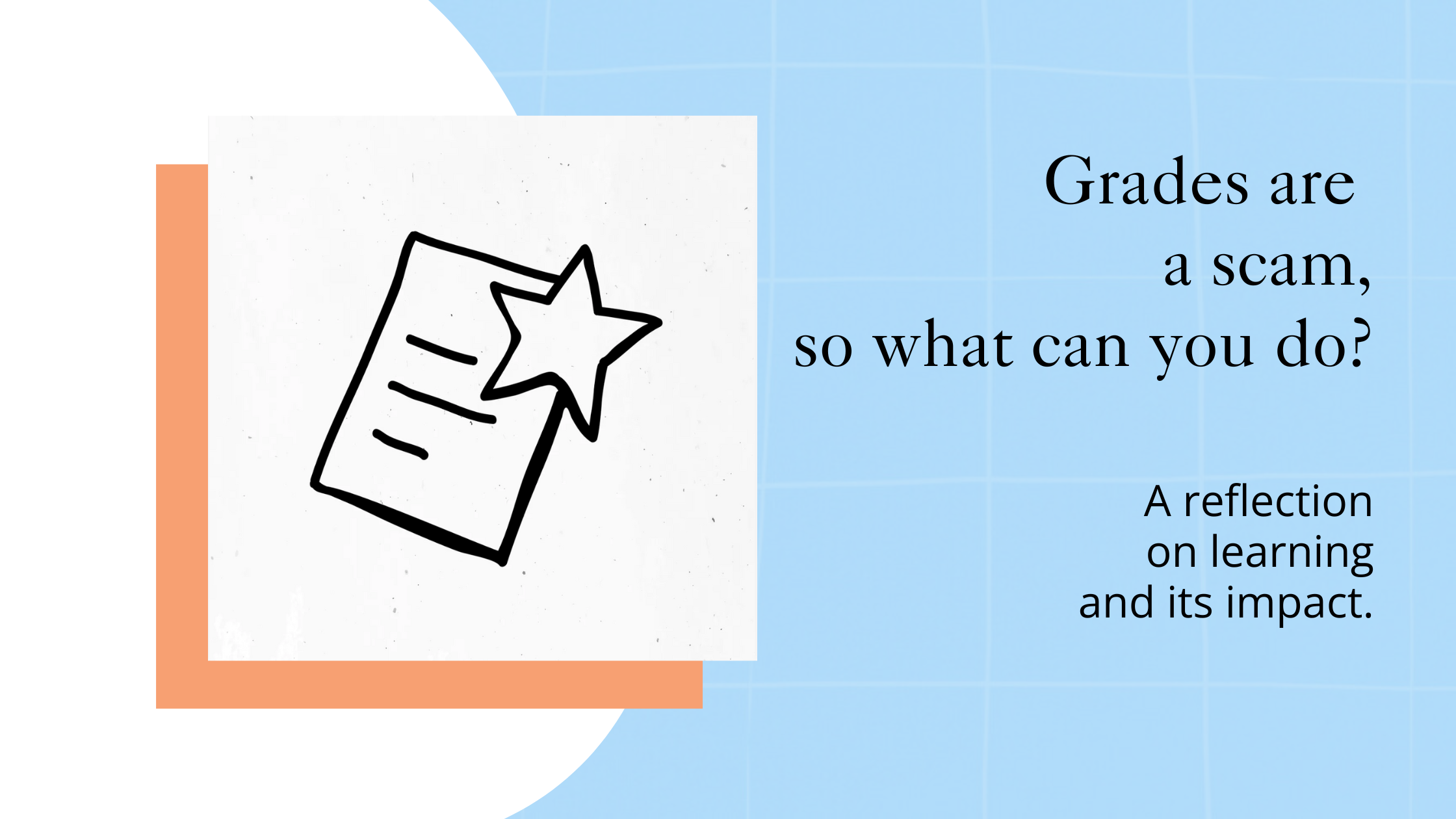First, I got as many A+ as C-, going through some F’s. Yet, in hindsight, I can assure you that the times when I learned the most, my grades were in the C- (or even less " good"). The height of irony? I had the chance to start a course in education sociology at the Université de Montréal... which I never finished because it was in the middle of the 2012 student strike.
Ultimately, the aim is to highlight the challenges of the current system and encourage reflection on possible alternatives to promote more authentic and fulfilling learning, both at school and at work.
Why are notes a scam?
Grading systems are the result of a desire to achieve three objectives quickly and easily:
- Measure learning.
- Communicate learning.
- Motivate.
What does it look like? In reality, measuring learning by a grade or percentage is completely off (voluntary pun). Let’s be honest, we all end up identifying the courses and teachers that are the easiest to get from " good grades" . And this is just the beginning.
We can easily ask ourselves pertinent questions such as: ” What does a B mean? Is it because I've understood a good part of it, but need to improve to understand it all? Or is it because I made too many spelling mistakes? Or because I've been late too many times? Or because I understood perfectly, but wasn't at my best that day? ”. All of these answers are possible. I will not even enter into the debate on the difference between “ understanding " and " memorizing".
In theory, motivation is fuelled by the desire to get a good mark, but in practice, there's also the fear of getting a bad mark. After all, those grades are going to be communicated yes, and not just to our parents, but also to other schools and employers. So how do you get good grades?
By doing what is expected of the person who decides on these notes, taking as little risk as possible, doing what we are told as quickly and effectively as possible, learning to be silent. After all, being disruptive in class is just one way of getting worse grades, of being excluded from the " rewards", etc.
Yet it's by challenging ourselves, and even failing, that we learn the most. I'm going to be even more defeatist than that: once you've achieved the A, why try to do better? Why even wonder if it's possible to do things differently? A grade becomes a way of punishing everything that allows the greatest learning to take place. It's not a source of pride or motivation, it's both a promise and a threat to a better future, it's a carrot and a stick, it's a gun to your head.
Motivation
There are two types of motivation: intrinsic and extrinsic. The difference is that intrinsic motivation comes from within and extrinsic motivation comes from without. Which do you think is more effective? Which is used in a grading system?
We often feel that we know motivation in a way that encourages us to settle for less because it’s easier than trying harder or challenging ourselves. The popular belief of rewards is a great example. It is instinctive to believe that simple rewards are enough for everyone in all situations. This is a phenomenon more scientifically known as selective abstraction, which consists of drawing conclusions without taking into account all the elements, or simply to " jumping to conclusions".
The problem is that simple rewards for " success " transform a learning environment into a packaging plant. There is a huge difference between doing something for a reward and doing it because you really want to do it.
To better illustrate, imagine another situation: ” I'll give you $5 if you eat this sandwich. “. Misused rewards have the same effect: they underline the fact that the task is not worth doing, and that compensation is needed. What's more, in these situations, the task is completely forgotten and the focus is on the reward.
And that's not all: once we get used to rewards, especially for something that otherwise loses its value, we need them more and more until we can't do anything without them. The reward becomes necessary to do the same thing, and only increases with repetition.
I'd like to take this opportunity to say that I don't blame anyone for focusing on their goals. In these situations, I'm the first to say to myself ” I want to get good grades and then find a good job “. Notice that in this type of sentence, learning is never mentioned. When I finished university, I started focusing on learning.
One more reason why extrinsic motivations don't work as effectively as intrinsic ones is simply that control doesn't come from yourself. Something you do for someone else or by outside intervention can never be a definitive solution. The only real solutions come from within. This is as true in learning as it is in problem-solving, growth and therapy.
On the other hand, intrinsic motivators are great for one thing: control over others. I digress a bit, but if in your life you feel you're not in control, here's why. Sometimes we prefer to leave control and responsibility in someone else's hands, and in those cases, that's how it goes.

What to do in schools?
Sans vouloir complètement négliger les récompenses, car elles ont leur place, mais elles sont tout simplement surutilisées, comme un enfant qui prendrait à l’extrême le conseil « santé » de manger des brocolis jusqu’à s’en rendre malade. La surutilisation des récompenses dans tous les aspects de notre vie nous fait croire que nous n’avons que si peu d’options.
Fortunately, possible solutions don't involve doing nothing and letting people succeed or fail on their own. As we've already mentioned, the most effective solutions come from within, which means that a person who wants to learn will succeed. Who better to support a person who wants to learn than another person who wants to learn?
In the state of our schools, the objective that has motivated their systems is social control to create people who don't let too much of their imagination and creativity go to their heads.
If what we want (if, to each his own) is to learn to think, question and move forward without fear of the failures that allow us to reach our highest potentials, we must give ourselves the chance, which means shifting from the extrinsic rewards that represent control to the intrinsic rewards that represent the freedom to become what we want by empowering ourselves rather than waiting for someone else's approval.
Learning happens through discovery. When information is acquired through someone else's intervention, it's not learning, it's knowledge transfer. Knowledge transfer is important above all for preserving the information accumulated through learning, but it has its very important limitations, not least that the quantity and speed of transmission are limited. This is why books are used to preserve knowledge.
How do you apply discovery in a school? We need to move from transmission and constant evaluation to three elements:
- collaboration.
- content.
- choice.
Collaboration is the way most people will use knowledge in their professional and personal lives. Content is the most beneficial thing we’ve had since technological improvements. We have no excuse. We can easily create " memes ” to make the content more interesting and, most importantly, to make people think. Engaging, interactive and relevant content based on the lives of learners can be created faster and more efficiently than ever before.
Are you familiar with the term gamification or ludification ? A simple example: use Minecraft,a block-building game extremely popular with children and adults alike, for learning dimensions, geometry, programming, management, design and more.
There's only one way to engage with content: have good reasons, so it's clear that the content is relevant and useful. Reward (yes, the irony is intentional) for reading this far: I'm definitely going to write an article on the subject with relevant help!
It may seem scary and difficult, but that’s the challenge of teaching, finding ways to learn. The third element in achieving optimal learning is the most difficult. “ “Allowing choice ” does not allow for as much planning of assessments in advance and to repeat them as simply as possible.
The most stressful part of being a teacher is the thought of losing control. Yet, with intelligent methods, there are ways to keep control positive and organized. Choosing doesn't mean choosing anything without reason. Students can be led to choose how they are assessed by defending their point of view, for example by mentioning that for them, making a video rather than a written piece of work allows them to explore something new and relevant. Creating goals and the means to achieve them would be a major and important learning.
Here are some typical phrases and associated answers.
- " But if I don't use grades to force attendance, students won't come to class! "
If this is really the case, it means that the course isn't interesting and/or engaging enough. The aim should be to make the course interesting. If, as a teacher, you're forced not to do this, then the school has an even bigger problem and the whole institution isn't worth our attention. If the budget is a problem, then, just like a business, if it's not viable, it shouldn't continue. - " But how will students and parents know how they're progressing in class? "
The aim would not be simply to do away with grades and change nothing else. We need to replace them with something representative, real and useful. For example, we can use feedback, meetings, involving students in the process to also clarify where they think they are and why.
We can also include information such as difficulties encountered, possible solutions and so on. Yes, it takes more time, but we all win, and these questions are asked by everyone who is interested. Notes don't avoid these questions, and they don't answer them. - " But if I don't give my students grades, they won't be accepted into other schools! "
What do you think is more convincing: a list of letters or numbers or a personalized letter of recommendation? - " Wouldn't such a system be more influenced by teachers' prejudices? "
No. No more than the grades which are ultimately arbitrary. The teacher would be a guide rather than a judge.
What to do at work?
Another popular belief is that if people were not paid to work, far too many would not. Yet we all do a lot of things without being paid, whether it’s a hobby, personal projects, etc. Why? Because we care, because it’s useful. So why shouldn’t work be interesting and useful? In fact, nobody really wants to " do nothing".
I remember the first time I enjoyed two weeks of pure vacation, with no one to ask me anything, with nothing to do, absolutely nothing. I remember the horror of discovering that the television only repeated the same things several times a day and bored me very quickly.
There is no such thing as a bad job, but there are bad work environments, bad working conditions, bad companies to work for. You’ve probably had that discussion with someone where you say, “ nope, I would never do the job you do even if I was paid very well! " and where your interlocutor answers you " I would even do it for free! .
I absolutely must quote the video that inspired this article: “ Foods that don’t contribute enough vitamins are junk food. Jobs that don’t contribute enough money to live are junk jobs! .
In free translation, it would be " Les aliments qui n’apportent pas assez de vitamines sont de la « malbouffe », ou nourriture de mauvaise qualité. Un emploi qui ne fournit pas assez d’argent pour vivre est un emploi de mauvaise qualité ! .
For those not familiar with English, the term junk of junk food is much more pejorative (negative, derogatory, intentionally mean) than poor quality. Junk means scrap or garbage, so the term junk food involves eating garbage, so working in an equivalent place would be working for a rubble company.
Unfortunately, there are also people who do work that is not their best fit. To this, I have only one piece of advice: doing a job you hate is both an insult and a disservice to yourself and the company you work for, because not only will you create less interesting results than what you can do, but you will also make it difficult for the company to determine what it can improve.
Conclusion
By creating our own organization, we wanted to optimize our methods, our schedules and avoid falling into traps easily learned at school and even in the workplace. It is also not that we believe that those who do not do as we do are wrong or that we have the miracle solution. I simply think that it is important to mention what seems to be a problem but also to provide solutions. For us, it is to take charge of our daily life in our own way.
Here is the video which inspired this article.
We encourage you to try out these tips and share your results with us in the comments below. If you have any questions, please contact us here or visit our Q&A.

